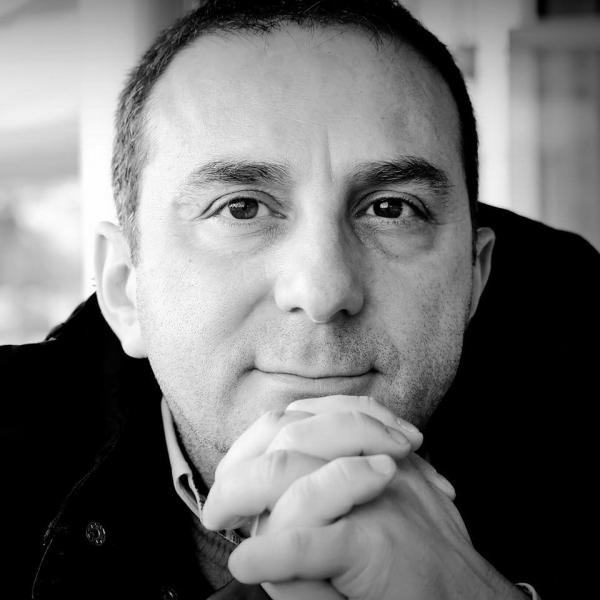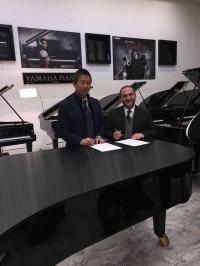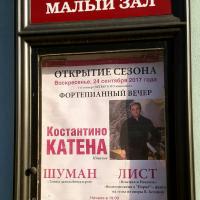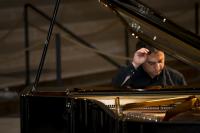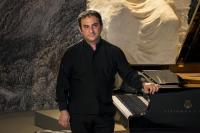Chattoir Interview with international concert pianist and Yamaha Artist
Costantino Catena
Yulia Berry: Hello, Costantino! Congratulations on the amazing success of your solo piano recital in the Philharmonics’ Hall of my native Saint-Petersburg, Russia! All seats were sold out, the audience went crazy and they want you back! Did you find the Russian audience different?
Costantino Catena: Thank you, Yulia! Playing in St. Petersburg was very nice, I found an enthusiastic and passionate audience. I had many positive reviews and I was invited to come back next year. The attention to the art and the emotional expression that I found in the public surely comes from the great cultural tradition of this beautiful city, and this background produces a truly special audience, even compared to other important realities that I know in the rest of the world.
It was your first time in Saint-Petersburg – the city, built by best Italian architects, such as Bartolomeo Rastrelli and others. It also carries the unofficial name of Northern Venice. What did you think of the city?
With the presence of so many rivers and canals you can imagine Venice of the North, but in fact, Venice is very different, mainly in the size and density of the aquatic network. Saint-Petersburg is a really magnificent and impressive city. You immediately perceive the atmosphere of a big European capital. In the grandeur of the buildings and the size of the streets, rivers, and museums you can feel the great power of the Tsar and how Saint-Petersburg used to be in 1800s. Surely it is a city to visit, which can not be missed on a tourist's map.
What was your most memorable moment there?
For sure the evening of the concert: I was greeted with so much enthusiasm and applause, which was very exciting.
You are a Yamaha Piano Artist. Yamaha to me is special, as I play a Yamaha flute myself and love it for its beautiful sound and durability. What can you say about Yamaha pianos?
Yamaha pianos have always been a synonym of reliability and standard uniformity over the years. Sviatoslav Richter exalted its quality in terms of touch sensitivity (a coincidence: Richter met his first Yamaha in Italy in 1969, the year I was born!) and always opted to use it for his concerts. I have to say that in the recent years Yamaha pianos with the new series (CFX, S etc.) have grown a lot: if there have already been beautiful pianos, now they can be compared to the oldest and best-known brands in terms of touch and sound, and the keyboard remains extraordinarily "easy" to use because it responds to the minimum stresses of the fingers.
In addition, since 2008 Yamaha owns Bösendorfer, that just gave a birth to a very beautiful piano (the Concert Grand Vienna 280VC) with which I recorded Schumann’s Fantasie op. 17 and Liszt’s Sonata in B minor, a CD devoted explicitly to this new piano, and which will be released in the coming months by Camerata Tokyo.
What age did you start learning the piano?
I started very early, at 4 years old. There were already some musicians in my family (my grandfather and my aunt) and an old piano that I still have.
How did you decide to become a professional musician?
I can’t really answer this question, as it came naturally. I simply followed what I liked to do, sometimes even with obstinacy, and it came all by itself.
Do you ever get nervous before or during your performances?
Certainly it is impossible to be indifferent before or during a performance, as it is impossible to completely detach yourself from the emotions. Each of us, however, develops over the years the ability to better manage emotions, keep them as much as possible under control and finalize them to a good performance. Indeed by being able to channel them in the right way, one enriches a performance and makes it an ever-unique event linked to that particular emotional and mental state.
What would you suggest to aspiring musicians to help with the stage frights?
This is a very arduous question. It is always so difficult to confront the public that even some great artists had to succumb to the anxiety of a public performance, and some of them (for example, Glenn Gould) had even withdrawn from the scenes. However, there are methods to deal better with the "fear" of the stage: first of all it is the preparation. Often - especially it is true for young people - they tend to exercise mechanically, letting their hands to be above the brain. Also, when they study at home, they do not take into account what's going to happen in public, they are too relaxed and underestimate the pieces and the scope of what they are going to do.
When you are studying at home, in short, you are smart and relaxed; in public, however, there are so many factors that make it difficult to keep concentration. If memory is based only on nerve and muscle connections, on automations without a real awareness, the anxiety can collapse everything. So, first of all it is a solid preparation. The second point is the origin of fear, which is not related to the public, but to the image that we have of ourselves: we are afraid to be judged and we question ourselves.
Negative experiences can have important repercussions on our ego, and it's important to learn to have confidence in yourself with the help of your teacher and with a good public presentation strategy. Often the public is confronted in the same way you go to the scaffold, amplifying the feeling of inadequacy and tension that end up worsening the control of the nerves. A more "friendly" attitude and being open to the public can certainly help to improve our fear management.
These verses are drawn from the famous Ithaka poet by Constantine P. Cavafy and they show very well the feeling of the fears that afflict us, and that they almost always come not from outside, but from inside us:
Laistrygonians and Cyclops,
angry Poseidon—don’t be afraid of them:
you’ll never find things like that on your way
as long as you keep your thoughts raised high,
as long as a rare excitement
stirs your spirit and your body.
Laistrygonians and Cyclops,
wild Poseidon—you won’t encounter them
unless you bring them along inside your soul,
unless your soul sets them up in front of you
Performing takes a lot of energy. How do you rest and restore the energy after the concerts?
Generally, when I travel for concerts, I always stay there for a few more days (even in St. Petersburg I stayed two days longer) to relax and visit the city. Often, however, I do not feel tired after the concert, but there is this strange feeling of wanting to start over again, to repeat the concert as soon, as possible. Yes, I must say I do not suffer much from the post-concert fatigue.
You studied and received degrees in philosophy and psychology, additionally to music. How important it is for a musician to get deeper into those fields?
I think a musician should always be well-educated and complete from a cultural point of view. Cultural education is often overlooked to become a kind of an extreme specialization, made only of instrumental exercise, but musicians, such as Schumann (for example), have taught us that love for literature - in this case - confers depth on musical thought, enriching it a lot. Such a speculative discipline as philosophy teaches to see so many roads and not a single predestined way. Psychology, on the other hand, has allowed me to study in depth the mental mechanisms underlying the performance and also how the latter can be influenced by factors, such as anxiety and fear, discussed above.
You often perform works by Liszt and Schumann. What do you find in their music that makes it so special to you?
I am very attached to Romanticism in general, and above all to these two great authors. Liszt's fascination with young pianists is always very strong, and I was also a victim. Unfortunately, it often ends up dominating its great virtuosity over music, and this is the source of various prejudices about its production. In fact, Liszt was one of the milestones, one of the points of reference in music history, and also the inventor of the recital in the form in which we know it: he himself often warned his students to play superficial and virtuosic and invited them to emphasize the musical elements even in the most strictly virtuosic and funky passages.
With age I learned to emphasize things that in youth generally succumb to the desire to show all the strength and speed that you are capable of: this way it becomes a continuous discovery and this composer make you improve a lot, at all points of view. The lisztian "assurances" are a bit opposed to Schumann's uneasiness: the characteristic that has attracted and made me love this great romantic composer is just the “sehnsucht”, this infinite search, without certainty, without objectives, similar to the philosophical speculation of which we talked about before. His writing is so dense and complex, tormented, and then sometimes he suddenly amazes you with simple and ethereal melodies, almost infantile. This bipolarity, these extremes are always present in his music and certainly make it difficult to follow but sublime.
You recorded many albums for the Japanese label Camerata Tokyo. It's a beautiful collaboration because the CDs, recorded by Camerata Tokyo have such an amazing quality of the sound and show your playing in the best possible way. What do you think makes the Japanese sound engineers' work so exceptional?
The attention to details, the great professionalism, the perfectionism that characterizes Japanese work is also present in this field. They are in love with European culture and come to Italy to record because they are looking for places with natural acoustics that give naturalness to the sound, as well as being beautiful and authentic. Before recording they study acoustics, and despite the natural reverb (which should also make editing more difficult) their products are always exceptionally beautiful. Many record labels today simply accept the already mastered master without overwhelming the quality for a simple business deal or an enrichment of the catalog. Camerata Tokyo does not publish anything that has not been selected and recorded by them, and this also makes a big difference.
Last year you performed and recorded works of Antonio Salieri - a very productive composer, whose pupils included Liszt, Schubert and Beethoven. This composer is not performed often, mostly because of the rumours of him having poisoned Mozart. How did you come up with this idea and what do you think of Salieri's music?
Antonio Salieri is a composer too often mistreated for comparison with the great Mozart. In fact, he was a great composer and left a large opera production: one of the disks to which I am most attached - and that certainly influenced my decision to record these two concertos - is recorded by Italian mezzosoprano Cecilia Bartoli, The Salieri Album , a collection of opera arias, sung wonderfully. Also, since the Italian instrumental repertoire from the second half of the 1700s onwards was "kidnapped" by the Opera, there are very few concertos for piano and orchestra by Italian authors. These two little jewels were the occasion to enjoy Italian music and to revive this music - almost operatic even in piano writing - to which, as an Italian, I’m very attached.
How did the audience react to his music?
They were very appreciated by the audience. At the end of the concert (where I played both concertos), many peoples expressed that the whole concert was too short.
What are your future plans and upcoming projects?
This year I will record many things. Next month I will start by continuing the Salieri trend and recording the piano concerto by Domenico Cimarosa: there is currently only one version for fortepiano. It will be followed by the recording of all piano works by Ermanno Wolf-Ferrari, an Italian composer of the 1900s, known for the Opera, but whose piano pieces have never left the library. For Camerata Tokyo in the Spring I will record Carnaval op. 9, Carnaval de Vienne op. 26, and Phantasiestücke op. 12 e op. 111 of Schumann, continuing with the recording of all piano masterpieces of this composer (soon will be released the recordings of Davidsbündlertänze op. 6 and Humoreske op. 20, and then Symphonic Etudes op. 13 in full version, Kreisleriana op. 16, Kinderszenen op. 15, Papillons op. 2, 3 sonatas for the young op. 118, Abegg-Variations op. 1, Arabeske op. 18).
Thank you, Costantino for the great conversation! I look forward to your new recordings and wish you best of success!
Thank you, Yulia!
